Genetic testing has become more accessible than ever, with options ranging from at-home kits you can order online to comprehensive tests ordered by healthcare providers. Direct-to-consumer genetic testing[1] allows people to learn about their genetic makeup without visiting a doctor, while clinical genetic testing requires professional oversight and interpretation.
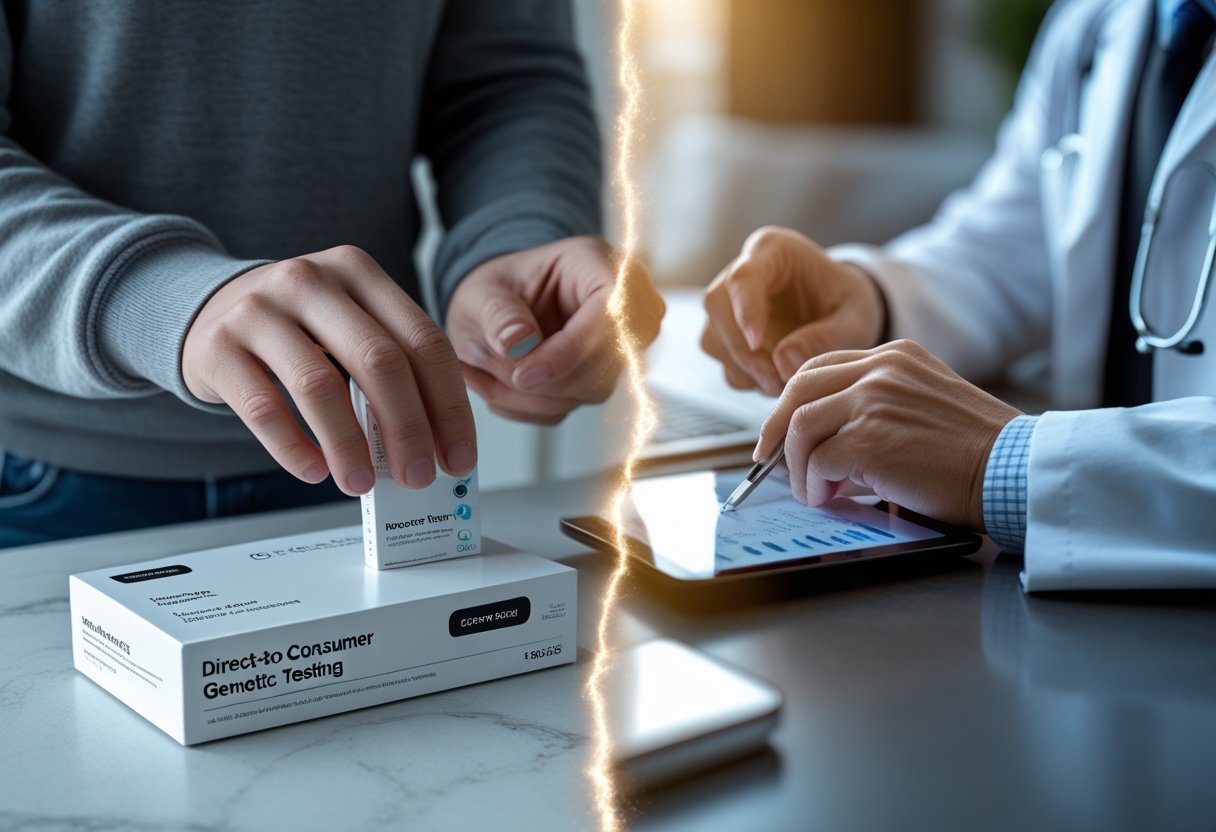
For prevention purposes, doctor-ordered genetic testing generally provides more accurate, comprehensive results that lead to better health outcomes than direct-to-consumer options. Clinical genetic tests are designed and validated for medical purposes[2], targeting specific gene variants with established links to diseases and offering higher accuracy than direct-to-consumer alternatives.
The choice between these testing methods affects how people understand their health risks and make prevention decisions. While direct-to-consumer tests offer convenient insights[3], they come with important limitations that consumers should understand before making health-related choices based on their results.
Key Takeaways
- Doctor-ordered genetic testing provides more accurate and medically relevant results for disease prevention than direct-to-consumer options
- Clinical genetic tests include professional interpretation and guidance that helps people make better health decisions
- Direct-to-consumer tests offer convenience but have significant limitations that can lead to misunderstandings about health risks
Understanding Genetic Testing Methods

Genetic testing analyzes DNA to identify changes in genes, chromosomes, or proteins that may indicate disease risk or inherited conditions. These tests examine specific genetic variants through laboratory analysis of biological samples like saliva or blood.
What Is Genetic Testing?
Genetic testing examines a person’s DNA to look for changes that might cause disease or increase disease risk. Clinical genetic tests are designed and validated for medical purposes[2], targeting specific gene variants with established links to diseases.
The testing process identifies mutations, deletions, or other alterations in genetic material. These changes can reveal predisposition to certain conditions before symptoms appear.
Healthcare providers use results to guide treatment decisions and prevention strategies. Doctors can better predict which prevention strategies or treatments will work best[4] when they understand genetic disease origins.
Genetic tests can also help diagnose existing conditions or determine carrier status for inherited disorders. This information helps families make informed reproductive decisions.
How DNA Testing Works
DNA testing begins with collecting a biological sample containing genetic material. Common samples include saliva, cheek swabs, or blood draws.
Laboratories extract DNA from these samples and prepare it for analysis. The DNA undergoes purification and amplification to create enough material for testing.
Specialized equipment reads the genetic code at specific locations. These machines identify the sequence of nucleotides that make up genes.
Computer software compares the results to reference databases. This comparison reveals whether genetic variants are present at targeted locations.
The laboratory generates a report showing which variants were found. This report explains what each finding might mean for health or disease risk.
Types of Genetic Tests
Single Gene Tests examine one specific gene for mutations. These tests look for any genetic changes within that particular gene that might cause disease.
Panel Tests analyze multiple genes simultaneously. They focus on groups of genes linked to similar conditions or body systems.
Genomic Tests examine large portions of DNA or entire genomes. These comprehensive tests can identify thousands of genetic variants across many genes.
Direct-to-consumer genetic testing companies typically analyze specific variants in particular genes[5] rather than finding all variants in those genes. This approach differs from clinical testing methods.
Chromosomal Tests look at entire chromosomes or long segments of DNA. They can detect large-scale genetic changes like extra or missing chromosome pieces.
Biochemical Tests measure protein levels or enzyme activity. These tests identify genetic conditions by examining the products that genes create.
What Is Direct-to-Consumer Genetic Testing?
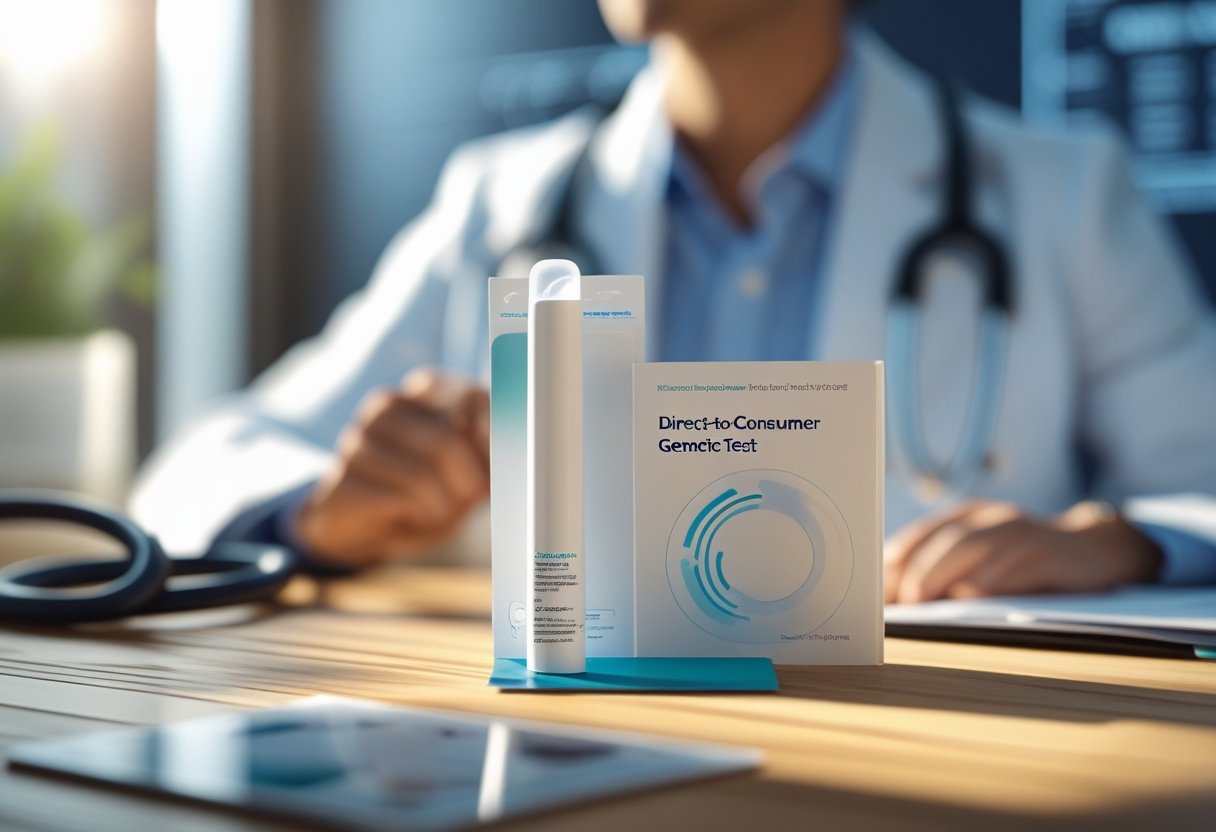
Direct-to-consumer genetic testing[6] allows people to buy DNA tests online or in stores without needing a doctor’s order. These tests analyze saliva or cheek swab samples to provide information about ancestry, health risks, and genetic traits through convenient at-home collection methods.
How DTC Tests Are Accessed
People can purchase direct-to-consumer genetic tests[7] through company websites, retail stores, or online marketplaces. The process starts when customers order a test kit and receive it by mail.
The kit includes detailed instructions and collection materials. Most tests require a saliva sample collected in a special tube. Some companies provide cheek swabs instead.
After sample collection, customers mail the kit back to the laboratory using prepaid shipping materials. Companies typically process results within 2-8 weeks.
Results are delivered through secure online portals or mobile apps. Customers create accounts to access their genetic information and any additional reports the company provides.
Popular DTC Test Types:
- Ancestry and genealogy testing
- Health predisposition reports
- Carrier status screening
- Pharmacogenetic testing
- Trait analysis
Popular Types of DTC Genetic Tests
Ancestry Testing traces family origins and ethnicity estimates using genetic markers. These tests compare DNA to reference populations worldwide to estimate geographic ancestry percentages.
Health Risk Reports analyze genetic variants linked to conditions like heart disease, diabetes, and Alzheimer’s disease. Companies examine specific genetic markers associated with increased disease risk.
Carrier Screening identifies whether someone carries genetic variants for inherited conditions. This information helps people understand risks of passing certain conditions to children.
Pharmacogenetic Testing examines how genetic variations affect medication response. These tests can indicate whether someone might metabolize certain drugs differently than average.
Trait Testing analyzes genetic factors influencing physical characteristics like eye color, hair texture, caffeine sensitivity, and muscle composition.
Limitations of At-Home DNA Tests
At-home genetic testing[6] provides screening rather than diagnostic information. These tests cannot confirm whether someone actually has a medical condition.
Key Limitations Include:
- Limited genetic coverage – Tests examine only selected genetic variants, not complete genome sequencing
- Population bias – Results may be less accurate for non-European ancestries
- No medical supervision – Results lack clinical interpretation from healthcare providers
- Variable accuracy – Different companies may provide conflicting results for the same person
Sample collection quality affects results accuracy. Contaminated samples or improper collection can lead to failed tests or unreliable data.
Most DTC tests focus on common genetic variants. They miss rare mutations that clinical testing might detect. This creates gaps in health risk assessment.
Results require careful interpretation since genetic risk doesn’t guarantee disease development. Environmental factors and lifestyle choices significantly influence actual health outcomes.
What Is Doctor-Ordered Genetic Testing?

Doctor-ordered genetic testing requires a healthcare provider’s prescription and takes place in medical settings. These tests examine specific genes linked to diseases and provide accurate results for medical decision-making.
Clinical Genetic Test Process
Clinical genetic tests[1] must be ordered by a healthcare provider and are administered at clinics, practices, or hospitals. The process begins when a doctor determines genetic testing is needed based on a patient’s symptoms, family history, or medical condition.
Healthcare providers collect samples during medical appointments. They send these samples to certified laboratories that specialize in medical genetic testing.
The laboratory analyzes the DNA for specific genetic changes. Clinical genetic tests are designed and validated for medical purposes[2] and target specific gene variants with established links to diseases.
Results return to the ordering healthcare provider first. The doctor reviews the findings and schedules a follow-up appointment to discuss results with the patient.
Role of Healthcare Providers
Healthcare providers play a central role in clinical genetic testing from start to finish. They decide when genetic testing is appropriate based on medical guidelines and patient needs.
Doctors interpret test results within the context of a patient’s complete medical history. Healthcare providers use clinical pharmacogenomic tests to help them get a better understanding of what medication might work best[1] based on their patient’s genetic makeup.
Healthcare providers consider multiple factors beyond genetics. These include drug interactions, lifestyle factors, and environmental influences that affect health outcomes.
Medical professionals provide genetic counseling when needed. They explain what test results mean for the patient and their family members.
Conditions Diagnosed Through Clinical Testing
Clinical genetic tests help healthcare providers identify genetic reasons for diseases[1] and guide treatment decisions. These tests can diagnose single-gene disorders like cystic fibrosis and sickle cell disease.
Testing identifies genetic conditions that cause developmental delays or intellectual disabilities. Healthcare providers use results to create specific treatment plans for patients.
Common conditions diagnosed include:
- Hereditary cancer syndromes
- Heart conditions passed down through families
- Metabolic disorders affecting how the body processes nutrients
- Blood disorders like hemophilia
Clinical testing also determines how patients metabolize medications. This helps doctors choose the right drugs and doses for each person’s genetic makeup.
Comparing DTC and Doctor-Ordered Genetic Tests for Prevention

Doctor-ordered genetic testing provides more comprehensive analysis and professional guidance[8], while DTC tests offer convenience and lower costs but with limited accuracy for disease prevention.
Accuracy and Reliability
Doctor-ordered genetic tests examine thousands of genetic variants for specific conditions. Clinical genetic testing analyzes many more mutations than DTC tests[9]. For example, clinical BRCA testing looks at over 1,000 mutations while 23andMe only tests three variants.
DTC companies focus on common genetic variants but miss rare mutations. This creates gaps in disease risk assessment. Most DTC genetic tests have poor discriminatory power because they test only major genetic variants[9].
Clinical labs must meet strict quality standards. They follow CLIA regulations and undergo regular inspections. DTC companies may not follow the same rigorous standards for laboratory testing.
Accuracy Comparison:
- Clinical tests: 95-99% accuracy for tested conditions
- DTC tests: Variable accuracy, often 70-85% for complex traits
- Clinical tests detect rare disease-causing mutations
- DTC tests miss most rare variants
Interpretation of Results
Genetic counselors help patients understand clinical test results. They explain what genetic test results can and cannot show about disease risk[9]. This guidance prevents misinterpretation and inappropriate medical decisions.
DTC companies provide automated reports without personalized explanation. Consumers may misunderstand their results and make harmful health choices. People sometimes experience stress when they receive unexpected DTC test results[9].
Professional guidance includes:
- Family history analysis
- Environmental risk factor discussion
- Lifestyle modification recommendations
- Follow-up testing suggestions
Genetic counseling helps protect consumers from misinterpretation of test results[9]. DTC reports often lack context about how genetics, environment, and lifestyle interact to influence disease risk.
Cost, Privacy, and Data Security
DTC tests cost $100-$1,000 and insurance rarely covers them. Clinical genetic testing costs $300-$5,000 but insurance often pays when medically necessary. Patients pay less out-of-pocket for doctor-ordered tests.
Privacy risks differ significantly:
- DTC companies may sell genetic data to third parties
- Clinical labs follow strict HIPAA privacy rules
- DTC genetic information might be stolen due to inappropriate security measures[9]
DTC companies own customer genetic data permanently. They can change privacy policies and data usage agreements. Clinical test results belong to patients and their doctors.
Consumers should know who will see their genetic test results and what security measures protect their information[9]. Clinical labs must follow federal data security requirements that DTC companies may not meet.
Some DTC companies share data with researchers without clear consent. This raises concerns about genetic discrimination and family member privacy.
Prevention and Clinical Impact: Which Is Better?
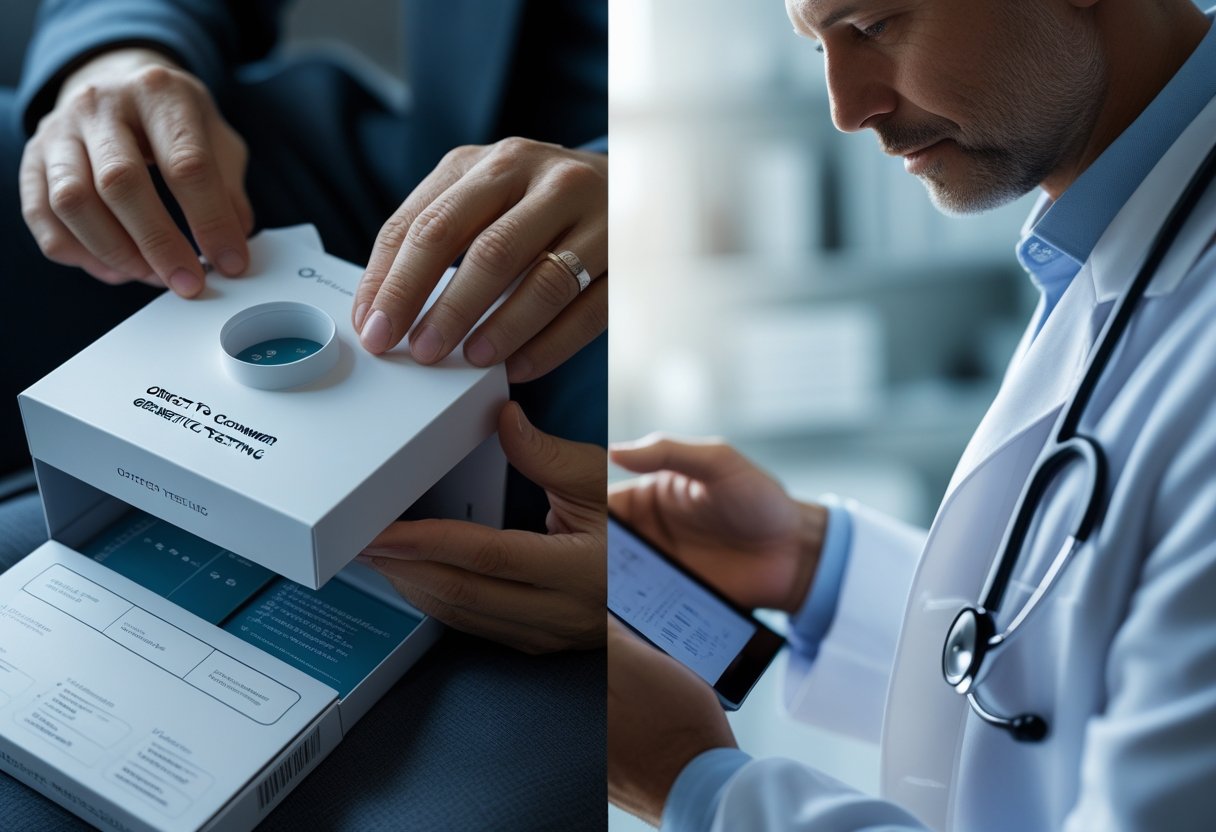
Doctor-ordered genetic testing provides more comprehensive disease prevention through professional interpretation and follow-up care. Clinical testing offers better accuracy for detecting serious health conditions and includes genetic counseling support that direct-to-consumer options typically lack.
Impact on Early Disease Detection
Clinical genetic testing delivers superior results for identifying disease risks early. Doctors can order comprehensive panels that test for thousands of genetic variants linked to specific conditions.
Direct-to-consumer tests examine only a few major genetic variants[9] related to diseases. This limited scope reduces their ability to accurately predict health risks.
For cancer detection, the difference is striking. Clinical BRCA testing analyzes up to 1,000 known mutations that affect breast and ovarian cancer risk. Consumer tests like 23andMe only examine three BRCA variants.
Clinical Testing Advantages:
- Complete genetic variant analysis
- Higher accuracy for disease prediction
- Integration with medical records
- Follow-up monitoring protocols
Doctor-ordered tests also consider environmental and lifestyle factors alongside genetic data. This comprehensive approach provides better risk assessment than genetics alone.
Family Health History and Prevention Strategies
Clinical genetic testing integrates family health history into prevention planning. Genetic counselors analyze patterns across generations to identify inherited disease risks.
This family-centered approach helps doctors develop targeted prevention strategies. They can recommend specific screenings, lifestyle changes, or preventive treatments based on both genetic results and family patterns.
Consumer tests provide limited guidance for family prevention. Users receive genetic data without professional interpretation of how results affect relatives or future generations.
Prevention Strategy Benefits:
- Customized screening schedules
- Family-wide risk assessment
- Preventive medication recommendations
- Lifestyle modification plans
Doctors can also coordinate care among family members. When one person tests positive for a genetic variant, relatives can receive appropriate testing and monitoring.
Genetic Counseling for Risk Assessment
Clinical genetic testing includes genetic counseling[1] as a standard component. Genetic counselors explain test results and help patients understand their actual disease risks.
A genetic counselor provides pre-test education about what results can and cannot reveal. They also offer post-test support to prevent anxiety and inappropriate health decisions.
Consumer genetic testing typically lacks professional counseling support. Users must interpret complex genetic information without medical guidance.
This difference matters significantly for prevention planning. Genetic counselors help patients avoid overreacting to results or making harmful health choices based on incomplete information.
Counseling Services Include:
- Risk interpretation and explanation
- Family planning guidance
- Emotional support and reassurance
- Coordination with healthcare providers
Professional counseling also addresses insurance and privacy concerns that affect long-term health planning.
Making the Right Choice for Your Health
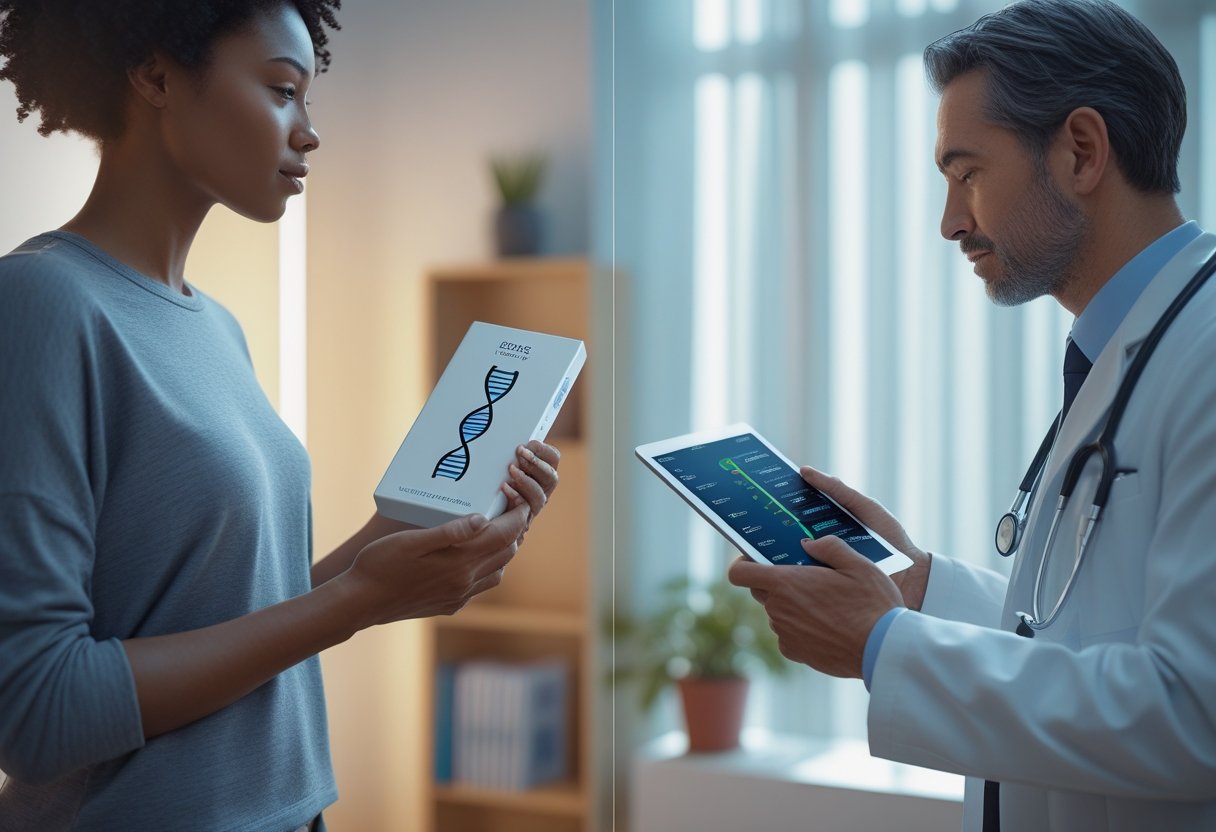
Choosing between direct-to-consumer and clinical genetic testing depends on your specific health goals, family history, and need for medical guidance. The decision requires careful consideration of multiple factors and understanding the limitations of each testing approach.
Factors to Consider Before Testing
Your family medical history plays a crucial role in determining which test type suits your needs. People with strong family histories of specific diseases like cancer or heart conditions often benefit more from clinical genetic testing ordered by healthcare providers[2].
Cost and insurance coverage significantly impact your choice. Doctor-ordered genetic tests may be covered by health insurance[10], while direct-to-consumer tests typically require out-of-pocket payment.
Consider your emotional readiness for unexpected results. Direct-to-consumer tests might reveal unexpected information about health, family relationships, or ancestry that could be stressful[11].
Privacy concerns matter when choosing testing options. Clinical tests become part of your medical record, while consumer tests keep results separate unless you share them with doctors.
Working With Healthcare Professionals
Healthcare providers help interpret complex genetic information and create action plans based on results. Clinical genetic testing offers a personalized approach with trained genetics professionals[12].
Doctors can determine which specific genes to test based on your medical history. They order targeted tests rather than broad screening panels that might not address your concerns.
Genetic counselors provide valuable support throughout the testing process. They explain what results mean and help you understand your actual disease risks.
Professional guidance becomes essential when test results suggest increased disease risk. Healthcare providers can recommend appropriate screening schedules or preventive measures based on your genetic profile.
Understanding Test Limitations
Both testing types have significant limitations that affect their usefulness for prevention. Direct-to-consumer tests look only at a subset of gene variants, so disease-causing variants can be missed[11].
Accuracy varies between different testing approaches. Consumer genetic testing results often need confirmation with clinical tests administered by healthcare professionals[11].
No genetic test can definitively predict whether you will develop a specific disease. Environmental factors, lifestyle choices, and other genes also influence disease risk.
Tests may not be available for the specific health conditions that interest you most[11]. This limitation affects both consumer and clinical testing options.
Regulatory oversight differs between testing types, with clinical tests having stricter quality standards than many direct-to-consumer options.
Frequently Asked Questions
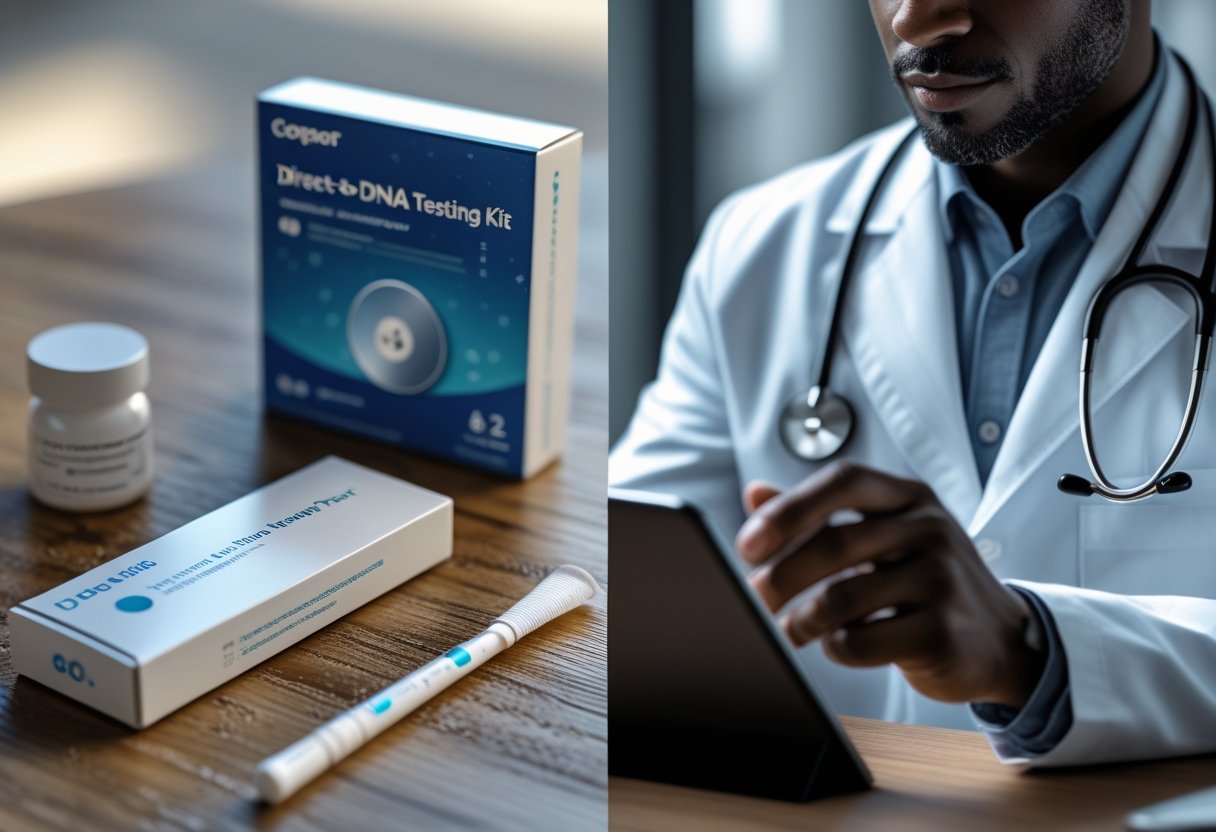
People often have questions about the differences between genetic tests they can order themselves and those prescribed by doctors. These questions cover accuracy differences, privacy concerns, and when each type of testing works best for health prevention.
What are the primary differences between direct-to-consumer and doctor-ordered genetic testing?
Direct-to-consumer genetic testing[13] allows individuals to order genetic tests directly from a company without involving a healthcare professional. People collect saliva samples at home and send them to laboratories for analysis.
Doctor-ordered genetic tests require a healthcare provider’s prescription. These tests typically happen in clinical settings like hospitals or medical offices.
Clinical genetic tests must be ordered by healthcare providers[1] because they guide medical decisions. Direct-to-consumer tests provide general health information that consumers can explore on their own.
The ordering process differs significantly between the two approaches. Direct-to-consumer tests skip medical consultations entirely.
How do direct-to-consumer genetic tests compare with doctor-ordered tests in terms of accuracy and reliability?
Direct-to-consumer genetic testing often does not test for all pathogenic or disease-causing variants[14] for particular conditions. This means results cannot rule out diseases completely.
Clinical genetic testing labs must have established quality standards[14] like CLIA certification and CAP accreditation. Direct-to-consumer companies are not required to have these credentials.
Doctor-ordered tests use more thorough genetic testing methods[14] including next-generation sequencing and copy number analysis. Direct-to-consumer tests typically use SNP arrays that examine smaller portions of genetic information.
Clinical labs confirm and interpret results within published medical guidelines. Healthcare professionals consider patients’ personal and family health histories when reviewing results.
What are the advantages and limitations of using direct-to-consumer genetic tests for health prevention strategies?
Direct-to-consumer testing provides results more quickly and costs less[14] than some clinical genetic tests. This helps people without adequate health insurance or established healthcare relationships.
The testing process is non-invasive and does not require blood draws. Consumers are not required to share results with insurance professionals[14], offering additional privacy.
Direct-to-consumer testing often happens without traditional genetic counseling[14], risk assessment, or informed consent. This means consumers may not fully understand what their results mean.
Some companies test for conditions that do not have confirmed clinical utility[14] or proven gene-to-disease connections. Results may be overwhelming or distressing without professional support.
In what ways does the involvement of a healthcare professional enhance the genetic testing process?
Healthcare professionals provide genetic counseling before testing begins. They explain what results might mean and help patients understand potential outcomes.
Doctors consider family medical history alongside genetic test results. This context helps create more accurate risk assessments for disease prevention.
Medical providers can recommend appropriate screening schedules based on genetic findings. They connect test results to specific preventive actions patients can take.
Healthcare professionals help patients understand which genetic tests are most relevant for their situations. They can distinguish between tests that provide actionable information versus those that do not.
Are there specific scenarios where direct-to-consumer genetic tests might be preferable over doctor-ordered tests?
Direct-to-consumer testing works well for ancestry research and general health curiosity. These situations do not require immediate medical decisions or interventions.
People without access to genetic counselors or specialists may benefit from direct-to-consumer testing as a starting point. This is especially true for those with insurance limitations[14] or long waiting times for appointments.
Individuals who want to participate in genetic research may choose direct-to-consumer companies. Many of these companies offer opportunities to contribute to scientific studies.
People seeking privacy from insurance companies might prefer direct-to-consumer testing initially. They can later share relevant results with healthcare providers if needed.
How do privacy and data security concerns differ between direct-to-consumer and doctor-ordered genetic testing?
Direct-to-consumer companies have been in the media for allowing law enforcement to access their databases[14] to solve crimes. This creates privacy and safety concerns for consumers.
Individual DNA may be used for research or commercial purposes[14] by direct-to-consumer companies. Consent for each use may not have been clearly given or understood.
Doctor-ordered genetic tests follow medical privacy laws like HIPAA. These regulations provide stronger protections for genetic information in healthcare settings.
Clinical genetic testing results become part of medical records. This creates both protection under medical privacy laws and potential concerns about insurance discrimination.
References
- Direct-to-Consumer vs. Clinical Genetic Tests?. https://genesight.com/blog/patient/whats-the-difference-between-direct-to-consumer-clinical-genetic-tests/ Accessed October 22, 2025
- Direct-to-Consumer or Clinical Genetic Testing: How to Know Which Test is Right for You – Smith Family Clinic. https://www.smithfamilyclinic.org/direct-to-consumer-genetic-testing/ Accessed October 22, 2025
- 5 things to know about direct-to-consumer genetic testing | Discovery | Prevention. https://utswmed.org/medblog/direct-consumer-genetic-testing/ Accessed October 22, 2025
- What's the Difference Between Clinical Genetic Testing for Diseases and Direct to Consumer Genome Testing?. https://arielmedicine.com/clinical-genetic-testing-vs-direct-to-consumer-genome-testing/ Accessed October 22, 2025
- What are the different types of genetic tests?: MedlinePlus Genetics. https://medlineplus.gov/genetics/understanding/testing/types/ Accessed October 22, 2025
- What is direct-to-consumer genetic testing?: MedlinePlus Genetics. https://medlineplus.gov/genetics/understanding/dtcgenetictesting/directtoconsumer/ Accessed October 22, 2025
- Direct-to-Consumer Tests. https://www.fda.gov/medical-devices/in-vitro-diagnostics/direct-consumer-tests Accessed October 22, 2025
- Direct-To-Consumer (DTC) Genetic Testing vs. Clinical Genetic Testing – What’s the difference?. https://www.ironwoodcrc.com/direct-to-consumer-dtc-genetic-testing-vs-clinical-genetic-testing-whats-the-difference/ Accessed October 22, 2025
- Direct-to-consumer genetic testing: advantages and pitfalls. https://pmc.ncbi.nlm.nih.gov/articles/PMC6808639/ Accessed October 22, 2025
- Tempted to have genetic testing? First ask why. https://www.health.harvard.edu/blog/tempted-to-have-genetic-testing-first-ask-why-202108172571 Accessed October 22, 2025
- What are the benefits and risks of direct-to-consumer genetic testing?: MedlinePlus Genetics. https://medlineplus.gov/genetics/understanding/dtcgenetictesting/dtcrisksbenefits/ Accessed October 22, 2025
- The Difference Between Direct-to-Consumer and Formal Genetic Testing. https://blog.virginiacancer.com/whats-the-difference-between-direct-to-consumer-and-formal-genetic-testing/ Accessed October 22, 2025
- Direct-To-Consumer Genetic Testing Vs Clinical Testing. https://www.needle.tube/blog/direct-to-consumer-genetic-testing-vs-clinical-testing Accessed October 22, 2025
- Direct-to-Consumer Genetic Testing FAQ for Healthcare Professionals. https://www.genome.gov/For-Health-Professionals/Provider-Genomics-Education-Resources/Healthcare-Provider-Direct-to-Consumer-Genetic-Testing-FAQ Accessed October 22, 2025
